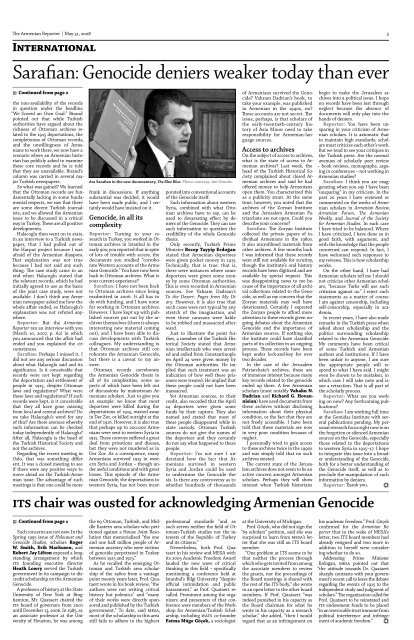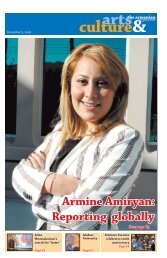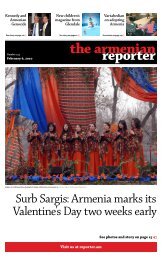Create successful ePaper yourself
Turn your PDF publications into a flip-book with our unique Google optimized e-Paper software.
The <strong>Armenian</strong> <strong>Reporter</strong> | May 31, 2008InternationalSarafian: Genocide deniers weaker today than evern Continued from page the non-availability of the recordsin question under the headline“We Scored an Own Goal.” Birandpointed out that while Turkishauthorities have argued about therichness of Ottoman archives relatedto the 1915 deportations, thecompleteness of Ottoman records,and the unwillingness of <strong>Armenian</strong>sto work there, we now have ascenario where an <strong>Armenian</strong> historianhas publicly asked to examinethese core records and he is toldthat they are unavailable. Birand’scolumn was carried in several majorTurkish newspapers.So what was gained? We learnedthat the Ottoman records are fundamentallylacking in some fundamentalrespects, we saw that thereare some decent Turkish journalists,and we allowed the <strong>Armenian</strong>issue to be discussed in a criticalway in Turkey. These are all positivedevelopments.Halacoglu then went on to state,in an interview to a Turkish newspaper,that I had pulled out ofthe Harput project because I wasafraid of the <strong>Armenian</strong> diaspora.That explanation was not truebecause I had not said any suchthing. The case study came to anend when Halacoglu stated thatthe relevant records, which he hadinitially agreed to use as the basisof the joint case study, were notavailable. I don’t think any <strong>Armenian</strong>newspaper asked me how thewhole affair ended, so Halacoglu’sexplanation was not refuted anywhere.<strong>Reporter</strong>: But the <strong>Armenian</strong><strong>Reporter</strong> ran an interview with you(March 10, 2007, p. A2) in whichyou announced that the affair hadended and you explained the circumstances.Sarafian: Perhaps I missed it. Idid not see any serious discussionabout what Halacoglu said and itssignificance. Is it conceivable thatrecords were not kept regardingthe deportation and settlement ofpeople in 1915, despite Ottomanlaws and regulations? What werethese laws and regulations? If suchrecords were kept, is it conceivablethat they all have gone missingfrom local and central archives? Dowe take Halacoglu’s word for anyof this? Are there avenues wherebysuch information can be checkedtoday independently of Halacoglu?After all, Halacoglu is the head ofthe Turkish Historical Society andnot the archives.Regarding the recent meeting inOslo, that was something different.It was a closed meeting to seeif there were any positive ways tomove ahead on the Turkish-<strong>Armenian</strong>issue. The advantage of suchmeetings is that one could be moreAra Sarafian in the new documentary, The Blue Blue. Photo courtesy: Ani Sounds.frank in discussions. If anythingsubstantial was decided, it wouldhave been made public, and I certainlywould have insisted on it.Genocide, in all itscomplexity<strong>Reporter</strong>: Turning to your researchin Turkey, you worked in Ottomanarchives in Istanbul in theearly 90s; you reported that in spiteof lots of trouble with access, thedocuments you studied “corroborateWestern accounts of the <strong>Armenian</strong>Genocide.” You have now beenback in Ottoman archives. What isyour current experience?Sarafian: I have not been backto Ottoman archives since beingreadmitted in 2006. It all has todo with funding, and I have nonefor working in Ottoman archives.However. I have kept up with publishedsources put out by the archivesthemselves (there is alwaysinteresting new material comingout), and I have been able to discussdevelopments with Turkishcolleagues. My understanding isthat Ottoman archives still corroboratethe <strong>Armenian</strong> Genocide,but there is a caveat to my answer.Ottoman records corroboratethe <strong>Armenian</strong> Genocide thesis inall of its complexities, some aspectsof which have been left outof discussions by mainstream <strong>Armenian</strong>sscholars. Just to give youan example: we know that mostdeportees were killed during thedeportations of 1915, wasted awayin Der Zor, or killed outright at theend of 1916. However, it is also truethat perhaps up to 200,000 <strong>Armenian</strong>swere sent to western Syria in1915. These convoys suffered a greatdeal from privations and disease,but they were not murdered as inDer Zor. As a consequence, many<strong>Armenian</strong>s survived 1915 in westernSyria and Jordan – though underawful conditions and with greatlosses. This episode of the <strong>Armenian</strong>Genocide, the deportations towestern Syria, has not been incorporatedinto conventional accountsof the Genocide itself.Such information about westernSyria, combined with what Ottomanarchives have to say, can beused to devastating effect by deniersof the Genocide. They can usesuch information to question thecredibility of the whole Genocidethesis.Only recently, Turkish PrimeMinister Recep Tayyip Erdoğanstated that <strong>Armenian</strong> deporteeswere given pocket money in 1915.Technically, that is true: that is,there were instances where somedeportees were given some moneyby some Ottoman authorities.This is even recorded in <strong>Armenian</strong>sources. See Vahram Dadrian’sTo the Desert: Pages from My Diary.However, it is also true thatsuch cases were not typical by anystretch of the imagination, andeven these caravans were liableto be robbed and massacred afterward.Just to illustrate the point further,a member of the Turkish HistoricalSociety stated that <strong>Armenian</strong>intellectuals who were arrestedand exiled from Constantinopleon April 24 were given money bythe Ottoman authorities. He impliedthat such treatment was anindication of how well these prisonerswere treated. He implied thatthese people could not have beenmassacred.Yet <strong>Armenian</strong> sources, to theircredit, also recorded that the April24 deportees were given somefunds by their captors. They alsonamed and stated that most ofthese people disappeared while instate custody. Ottoman Turkishsources do not give the names ofthe deportees and they certainlydo not say what happened to thesepeople.<strong>Reporter</strong>: I’m not sure I understandhow the fact that <strong>Armenian</strong>ssurvived in westernSyria and Jordan could be usedto undermine the Genocide thesis.Is there any controversy as towhether hundreds of thousandsof <strong>Armenian</strong>s survived the Genocide?Vahram Dadrian’s book, totake your example, was publishedin <strong>Armenian</strong> in the 1940s, no?These accounts are not secret. Theissue, perhaps, is that scholars ofthe early-twentieth-century historyof Asia Minor need to takeresponsibility for <strong>Armenian</strong>-languagesources.Access to archivesOn the subject of access to archives,what is the state of access to <strong>Armenian</strong>archives? Last week, thehead of the Turkish Historical Societycomplained about closed <strong>Armenian</strong>archives and said he hadoffered money to help <strong>Armenian</strong>sopen them. You characterized thisas a publicity stunt. At the sametime, however, you noted that thearchives of the Zoryan Instituteand the Jerusalem <strong>Armenian</strong> Patriarchateare not open. Could youdescribe your concerns?Sarafian: The Zoryan Institutecollected the private papers of individual<strong>Armenian</strong>s in the 1980s.It also microfilmed materials fromother archives. A few months backI was informed that these recordswere still not available for scrutiny,though the institute’s oral historyrecords have been digitized and areavailable by special request. Thiswas disappointing news to me becauseof the importance of all archivalcollections related to the Genocide,as well as my concern that theZoryan materials may well havedeteriorated. Certainly I expectedthe Zoryan people to afford moreattention to these records given ongoingdebates about the <strong>Armenian</strong>Genocide and the importance of<strong>Armenian</strong> sources. If nothing else,the institute could have classifiedparts of its collection in an ongoingprocess. These records have beenkept under lock-and-key for overtwo decades.In the case of the JerusalemPatriarchate’s archives, these areof immense interest because manykey records related to the genocideended up there. A few <strong>Armenian</strong>scholars (most notably Vahakn N.Dadrian and Richard G. Hovannisian)have used documents fromthese archives without disclosinginformation about their physicalcondition, or the fact that they arenot freely accessible. I have beentold that these materials are nowin very poor condition because ofneglect.I personally tried to gain accessto these archives twice in the 1990sand was simply told that no sucharchives existed.The current state of the Jerusalemarchives does not seem to be anactive concern amongst <strong>Armenian</strong>scholars. Perhaps they will showinterest when Turkish historiansbegin to make the Jerusalem archivesinto a political issue. I hopeno records have been lost throughneglect because the absence ofdocuments will only play into thehands of deniers.<strong>Reporter</strong>: You have been unsparingin your criticism of <strong>Armenian</strong>scholars. It is axiomatic thatto maintain high standards, scholarsmust criticize each other’s work.But we tend to see your critiques inthe Turkish press. Are the normalavenues of scholarly peer review– book reviews, monographs, arguingin conferences – not working in<strong>Armenian</strong> studies?Sarafian: I think you are exaggeratingwhen you say I have been“unsparing” in my criticism. In thepast 20 years I have reviewed orcommented on the works of <strong>Armenian</strong>scholars in <strong>Armenian</strong> Review,<strong>Armenian</strong> Forum, The <strong>Armenian</strong>Weekly, and Journal of the Societyfor <strong>Armenian</strong> Studies. In each caseI have tried to be balanced. WhereI have criticized, I have done so ingood faith, with argument, andwith the knowledge that the peopleconcerned can respond. In fact, Ihave welcomed such responses tomy reviews. This is how scholarshipworks.On the other hand, I have had<strong>Armenian</strong> scholars tell me I shouldnot criticize other <strong>Armenian</strong> scholars,“because Turks will use suchcriticism against us.” I reject suchstatements as a matter of course.I am against censorship, includingself-censorship, especially in academia.In recent years, I have also maderemarks in the Turkish press whenasked about scholarship and thepolitics surrounding scholarshiprelated to the <strong>Armenian</strong> Genocide.My comments have been criticalof some Turkish and <strong>Armenian</strong>authors and institutions. If I havebeen unfair to anyone, I am surethe appropriate people will respondto what I have said. I mighteven be shown to be mistaken, inwhich case I will take note and issuea retraction. That is all part ofthe scholarly process.<strong>Reporter</strong>: What are you workingon now? Any forthcoming publications?Sarafian: I am working full timeat the Gomidas Institute with severalpublications pending. My personalresearch focus right now is onthe forgotten or silenced <strong>Armenian</strong>sources on the Genocide, especiallythose related to the deportationsto western Syria in 1915–17. I hopeto integrate this issue into a broaderunderstanding of the Genocide,both for a better understanding ofthe Genocide itself, as well as topreclude the manipulation of suchinformation by deniers.<strong>Reporter</strong>: Thank you. fITS chair was ousted for acknowledging <strong>Armenian</strong> Genociden Continued from page Such concerns are not new. In theSpring 1995 issue of Holocaust andGenocide Studies, scholars RogerW. Smith, Erik Markusen, andRobert Jay Lifton exposed a longstandingarrangement by whichITS founding executive directorHeath Lowry served the Turkishgovernment in its campaign to discreditscholarship on the <strong>Armenian</strong>Genocide.A professor of history at the StateUniversity of New York at Binghamton,Mr. Quataert chaired theITS board of governors from 2001until December 13, 2006. In 1985, asan associate professor at the Universityof Houston, he was amongthe 69 Ottoman, Turkish, and MiddleEastern area scholars who petitionedagainst a House Joint Resolutionthat memorialized “the oneand one half million people of <strong>Armenian</strong>ancestry who were victimsof genocide perpetrated in Turkeybetween 1915 and 1923.”As he recalled the emerging Ottomanand Turkish area scholarshipof the 1980s from a vantagepoint twenty years later, Prof. Quataertwrote in his book review, “theauthors were not writing criticalhistory but polemics” and “manyof their works were directly sponsoredand published by the Turkishgovernment.” To date, said MESA,most of the scholarship in this areastill fails to adhere to the highestprofessional standards “and assuch serves neither the field of Ottoman-Turkishstudies nor the interestsof the Republic of Turkeyand its citizens.”Nevertheless, both Prof. Quataertin his review and MESA withits 2005 Academic Freedom Awardlauded the new wave of criticalthinking in this field – specificallymentioning a conference held atIstanbul’s Bilgi University “despiteofficial intimidation and publicharassment,” as Prof. Quataert recalled.Prominent among the organizersand presenters of that conferencewere members of the Workshopfor <strong>Armenian</strong>/Turkish Scholarship,including WATS co-founderFatma Müge Göçek, a sociologistat the University of Michigan.Prof. Göçek, who did not sign the“69 scholars” petition, said she wassurprised to learn from MESA’s letterthat she was still an ITS boardmember.“One problem at ITS seems to bethat neither the process throughwhich who gets invited from amongthe associate members to reviewthe grants, nor the proceedings ofthe Board meetings is shared withthe rest of the ITS body,” she wrotein an open letter to the other boardmembers. If Prof. Quataert “wasindeed punished in his capacity asthe Board chairman for what hewrote in his capacity as a researchscholar,” she added, “then I wouldregard that as an infringement onhis academic freedom.” Prof. Göçekconfirmed for the <strong>Armenian</strong> <strong>Reporter</strong>that in the wake of MESA’sletter, two ITS board members hadalready resigned and two more inaddition to herself were consideringwhether to do so.Addressing Prime MinisterErdoğan, MESA pointed out that“the attitude towards Dr. Quataertsharply contrasts with your government’srecent call to leave the debateregarding the events of 1915 to theindependent study and judgment ofscholars.” The organization called forProf. Quataert to be reinstated andITS endowment funds to be placed“in an irrevocable trust immune frompolitical interference and infringementof academic freedom.” f

















